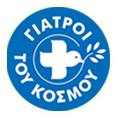Emergency assistance to moving populations throughout Greece
Greece is one of the most popular entry points to Europe for refugees and migrants. After the closure of borders in the Balkans, over 55,000 refugees are trapped in Greece, living in extremely difficult conditions.
In response to the growing needs of moving populations, and loyal to its vision to help the most vulnerable groups, Doctors of the World began in March 2016 a vast program that aims to support refugees across the country. It is a joint mission of Doctors of the World Greece, Belgium, France and Spain, entitled “Access to free and quality healthcare for refugees in Greece“.
The basic aims of the program are primary healthcare, sexual and reproductive health as well as psychosocial support. “These three needs are vital and we face them in all our fields of action”, explains Elisa Visconti, coordinator of the program. “We directly treat people and in parallel refer the most urgent and specialized cases to hospitals. We have midwives in all camps and a mobile unit with gynaecologists. We also address cases of Gender Based Violence (GBV) and try to assure a proper referral and a transfer in a secure environment”.
“Mental health is also an important issue. People in the camps are blocked in isolated locations and do not know what will happen in the future” comments Mrs. Visconti. “These immigrants have experienced traumatic situations – not only in their country but also on their way to Greece. They are under constant pressure. Entire families are housed in tents and do not have any intimacy. Moreover, they are running out of money, have no access to the labour market nor to the educational system and they lack activities. All this context builds up frustration”.
The program is funded by the European Union’s humanitarian aid department (ECHO: European Civil Protection and Humanitarian Aid Operations).

